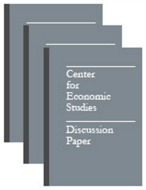The Closure Effect: Evidence from Workers Compensation Litigation
The Closure Effect: Evidence from Workers Compensation Litigation
Abstract
Consideration of the "best interests" of Workers Compensation (WC) claimants often involves the assumption that those who receive benefits in a "lump-sum" behave "too myopically" with respect to labor supply. However, many attorneys argue that lump-sum settlements induce a beneficial "sense of closure." In this paper, I provide an empirical context for these ideas using a unique set of linked administrative databases owned by the State of California. Upon receipt of a court-approved lump-sum settlement, WC claimants immediately increase labor supply. No such change is found for claimants who receive a court-approved settlement in which the insurer provides benefits over time, suggesting that the method of litigation settlement is a determinant of labor supply.
Others in Series
Working Paper
Working Paper
Working Paper




